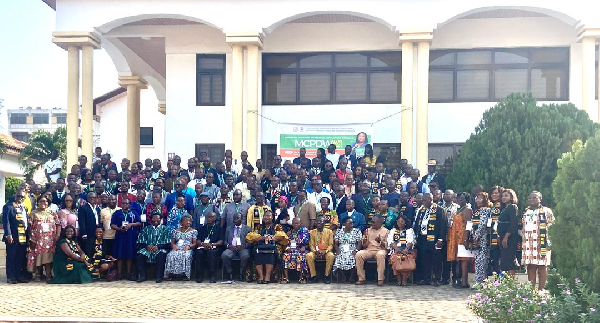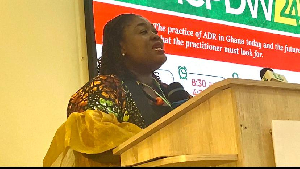The Deputy Attorney-General and Minister for Justice, Diana Asonaba Dapaah, has implored practitioners of Alternative Dispute Resolution (ADR) to, among other things, leverage emerging technology, enhance professional development, and engage in regional collaboration to realize the full potential of their roles.
Speaking at the Mandatory Continuing Professional Development Workshop for members of the Ghana National Association of Alternative Dispute Resolution Practitioners (GNAAP) on Saturday, December 14, 2024, Madam Asonaba also asked practitioners to engage in advocacy for policy innovation and adopt global best practices within their field in order to maintain their status as an indispensable part of the justice system.
“As we reflect on the current state of ADR and envision its future, one thing is clear: ADR is indispensable to our justice system. Its ability to resolve disputes efficiently, build consensus, and maintain relationships makes it an essential component of justice delivery. The insights shared today on integrating technology, enhancing professional development, engaging in regional collaboration, and advocating for policy innovation must inspire us to act decisively.
“Let us commit to advancing ADR in Ghana by adopting global best practices, building robust systems, and equipping ourselves with the tools and knowledge to remain effective in an ever-changing globe. In doing so, we not only strengthen ADR but also contribute to a fairer, more accessible, and more efficient justice system for all,” she stated.
She said the integration of new technologies in the practice is no longer optional but an essential step toward enhanced service delivery.
“The integration of advanced technologies into ADR practice is no longer optional; it is an essential step toward modernization and enhanced service delivery. AI can support case management by automating repetitive tasks, conducting detailed data analysis, and offering evidence-based suggestions for dispute resolution strategies. Tools like natural language processing can also streamline drafting, research, and arbitration award preparation.
“Online Dispute Resolution (ODR) platforms provide tools for mediators, arbitrators, and disputants to engage remotely, making ADR accessible to a wider audience. These platforms are particularly effective for cross-border disputes and ensure the resolution process is not hindered by logistical constraints. Blockchain technology enhances transparency and security in ADR processes. Smart contracts, which execute terms automatically upon agreement, reduce the likelihood of disputes over compliance,” she said.
She further urged the practitioners to broaden their horizons beyond the country and extend their practice into the sub-region by taking advantage of the many opportunities that exist within ECOWAS, the African Union, and the African Continental Free Trade Area (AfCFTA) through collaboration.
“Collaboration with regional and international counterparts is crucial for creating synergies and ensuring a harmonized approach to ADR. Building connections with ADR professionals across Africa and globally facilitates the exchange of expertise and resources, and here, I encourage GNAAP to consider such collaborations. It also enables practitioners to handle disputes involving parties from different jurisdictions more effectively.
“Ghanaian practitioners should actively engage with bodies such as the Economic Community of West African States (ECOWAS) and the African Continental Free Trade Area (AfCFTA). These organizations are shaping the future of trade and governance in Africa and rely on ADR to manage disputes arising from their operations. By collaborating on the development of regional ADR standards and practices, practitioners can contribute to creating systems that are consistent, fair, and predictable across borders,” the deputy minister noted.
On his part, the president of GNAAP, Daniel Owusu-Korangteng, stressed the significance of the professional development workshop and urged the members to take full advantage of the annual event.
“The social and economic factors that drive conflicts are diverse and dynamic, and it is a requirement for members of GNAAP to understand the dynamic nature of the ADR practice. The annual Mandatory Continuing Professional Development Workshops (MCPDW) of GNAAP are organized to improve and update the professional competencies of our members as a way of increasing their knowledge and confidence to meet the rapidly changing professional demands of the ADR practice.

“In addition to the aforementioned importance of the MCPD is the benefit of knowledge sharing and opportunities that can be created among the members of GNAAP to know themselves better when they have the opportunity to meet regularly. I am stressing the importance of members of GNAAP taking advantage of the MCPDW and any other forum of GNAAP to build the required network for the exchange of ideas and professional knowledge in ADR,” he said.
The event also served as a graduation ceremony for some 69 students of the Institute for Paralegal Training and Leadership Studies (IPLS) who received Professional Executive Masters Certificates in Alternative Dispute Resolution, while others received Professional Executive Masters Certificates in General Paralegal Service.
The event also saw the induction of ADR graduates as new members of the Ghana National Association of ADR (GNAAP) Practitioners.
Speaking to the media, the Rector of IPLS, Theresah Afua Brown, described the event as fulfilling and urged the graduates to be proficient professionals.
“We feel fulfilled, I think that is the word I will use. We would want them to be proficient professionals, and so being part of the Ghana National Association of ADR Practitioners, when we talk of practitioners in Ghana, we talk of practitioners who are proficient in what they do. And to say that every member that completes IPLS is a part of GNAAP is a great fulfillment for the institute,” she said.
Present at the event were some dignitaries, including the founder and patron of GNAAP, Mr. Alex Nartey.
General News of Thursday, 19 December 2024
Source: www.ghanaweb.com













